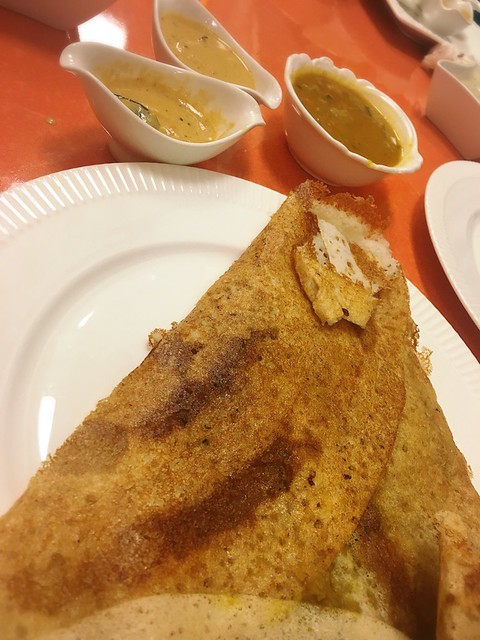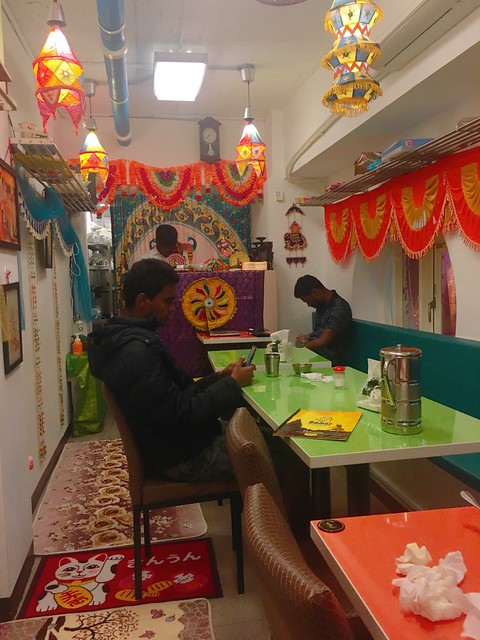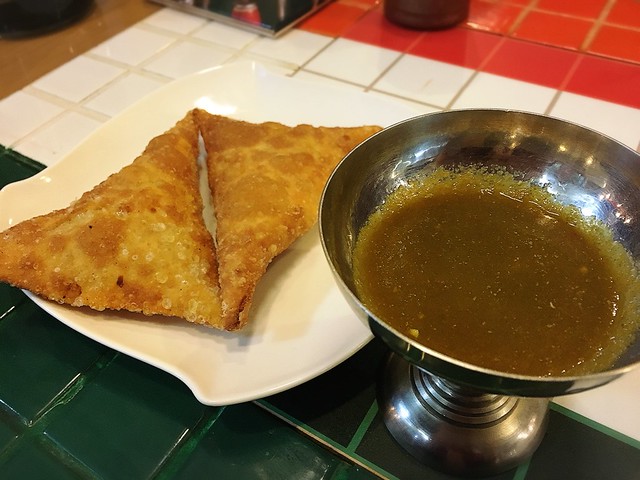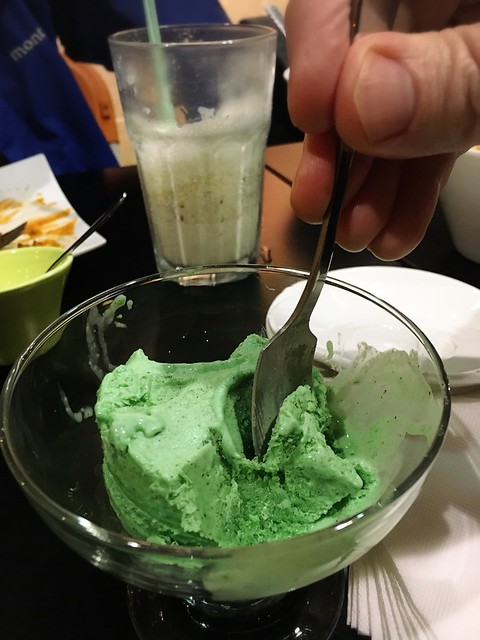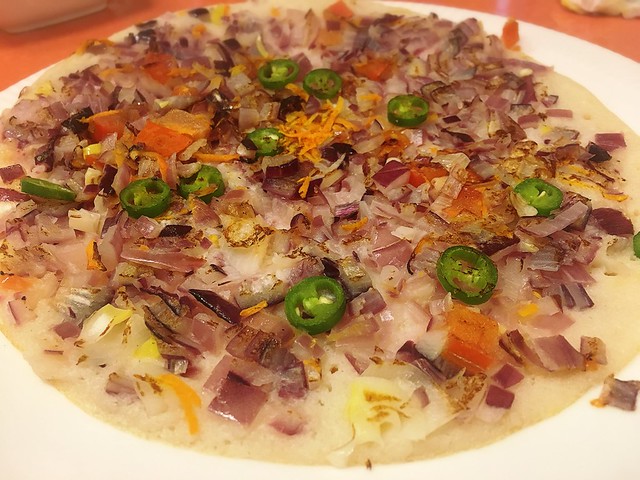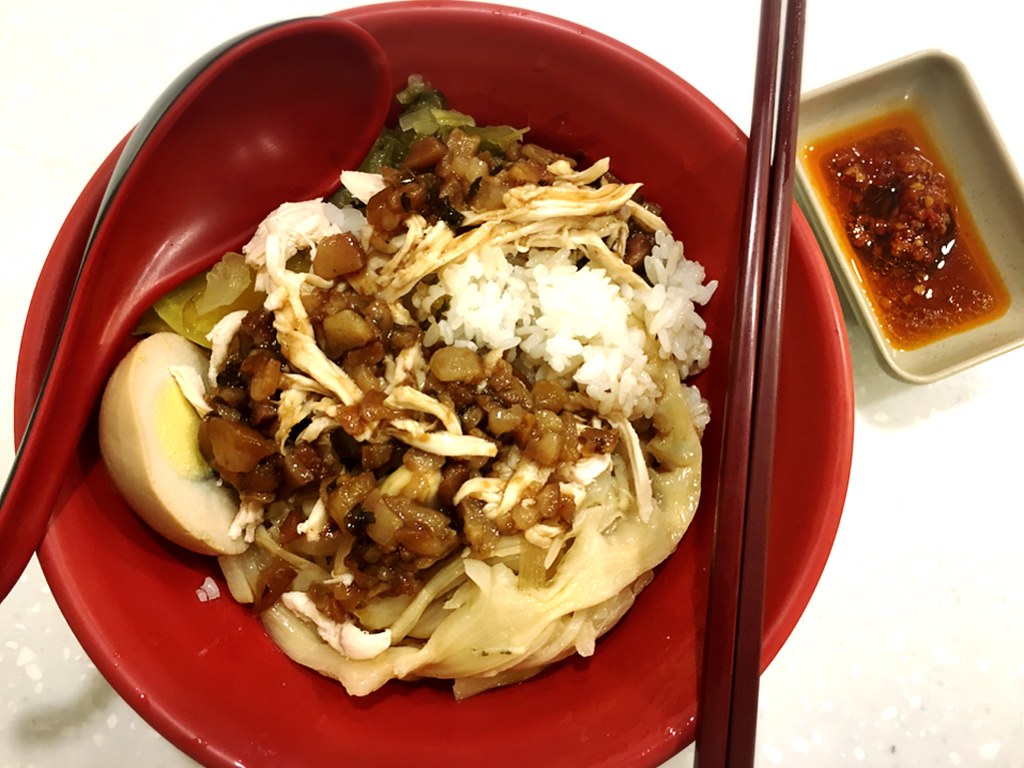 |
| Braised meat rice with shredded chicken, tender bamboo and tea egg with pickled radish. It was very good, and doesn't get more Taiwanese than this. |
Look, I know a lot is going on and I could write all about it now. Warmongering jerk and friend of Taiwan (guh) John Bolton is about to be promoted to National Security Advisor and...guh. Maybe I'll say something about it later. The Taiwan Travel Act is now law. Yay! The Daybreak Project is cool (although I have a low-key pet peeve about using the word 'project' to describe these sorts of things and I don't even know why, it's still cool and I won't hold that against it and you should check it out). I have been growing more annoyed in recent weeks with equating displaying the ROC flag with 'supporting Taiwan' and would like to say something about that.
I can and will write about some of these things, but I'm TIRED. My last paper of the term is due soon and I really need a montage. So, instead I want to write about food.
The Michelin guide for Taiwan came out and...eh.
I'm not even going to bother writing much about what made it in and what didn't, because maybe I'm too Anthony Bourdainy about this but...what is considered when awarding a star - what those guys think makes food great - is not what I think goes into food that is actually great. I never intentionally eat anywhere with a star, and am more than likely to avoid starred restaurants because they'll be pricey and crowded and frankly, I think the food is probably better in some local stall or market. Sorry, but between some Fancy Thing for NT$1500 from a restaurant that's been around for maybe a decade, or A-ma who has made onion pastries or gua bao for 50 years out of the same little stall...A-ma probably does a damn good job, quite possibly a better one, for a tiny fraction of the cost.
But I will say this - some people are upset that Taiwanese food didn't get more recognition from Michelin. The top-rated restaurants seemed to be in hotels, and tended to be either Chinese (not Taiwanese), Japanese or Western/innovative (I think there was one Taiwanese restaurant on there). And I get it - loving Taiwan means maybe hoping its food gets some international fine dining recognition. Some people reading this might even be thinking "why does Taiwanese food need to be defended?"
It has certainly been said before that there's a sad history in Taiwan of elevating cuisines from China to 'gourmet' status while treating Taiwanese food as a poor, not-as-good provincial cousin.
It's also been said that despite Taiwanese loving to rhapsodize about their excellent food, that it's actually...not that great. Basically, that maybe more Taiwanese restaurants didn't get Michelin stars because they didn't deserve them.
I'm going to take a middle road here.
I think Taiwanese food is great, and I also acknowledge it lacks the complexity and rarefied quality of some other cuisines (such as certain cuisines of China, most Southeast Asian food). And I'm fine with that.
When I say that I'd rather eat A-ma's onion cake or at some random market stall or just a good bowl of braised meat rice, and I think that food is fantastic, what I mean is that to me great food doesn't always come from a delicate kitchen genie spinning rare and expensive ingredients into improbably complicated food sculptures that melt in your mouth. While it's true that some expensive ingredients require expertise to work with - don't cast your fig balsamic or fleur de sel or even workaday lemon zest before swine because a thoughtless chef will destroy what is wonderful about these things - it's also true that okay chefs can make better food with better ingredients.
What really warms me inside is everyday ingredients made into something really tasty and satisfying. That takes a great chef. That takes A-ma who's been at it for half a century. Anyone can learn to make a good quality steak taste great.
But only real talent coupled with many years of practice can take gross old pork scraps and some soy sauce and whatever and make a freaking delicious braised meat rice. That is talent I admire.
It's also not the talent that bags Michelin stars (it might bag a Bib Gourmand note, but that's not the same thing) and I am totally okay with that.
And yet, I admit that Taiwanese cuisine lacks the vivacity of other foods - it doesn't have that deep, delicious tastes that Indian gravies are known for, or the marriage of tart, sweet, spicy and salty (and creamy, from the coconut milk) found in, say, Thai food.
I'm still okay with that - to me, Taiwanese food is what it is because of Taiwanese history. This is a country that was once described as having a "history of agonies". Even if you won't sign off on that description, it's a history of cohesive identity denied or actively suppressed, a history of being treated like a backwater or second-class colonial holding, of (until recently) poverty and agriculture and immigrants and refugees trying to carve out a better life - while, it should be said - making life harder for those already here, on this "ball of mud beyond the pale of civilization".
That - and not a great history as a self-ruled kingdom with all of the trappings of king and court like Thailand or Vietnam, or following the same imperial-dynasty based cultural and political evolution of China - is what made Taiwanese food what it is. We have taro rice vermicelli and sweet potato balls and a variety of single-bowl rice and noodle dishes because that's the food of Taiwan's past. We didn't have a royal palace where great chefs could practice their craft for state banquets. We didn't have the same number of rich or noble families eating rare and expensive delicacies from fine porcelain plates. We just...didn't (or we had much less of it).
When your recorded history is entirely made up of an interplay between indigenous groups, farmers and foreign colonizers (yes, this includes China, which has absolutely been a foreign colonizer twice over) living on "the edge of civilization", what you get as a "national cuisine" is down-home farmer food, gross pig scraps and soy sauce made tasty by talented grandmas, the same onion cakes for 50 years. That is just what you get.
And that's fine. Every time I eat a good braised meat rice or something like it, I don't think "well, this tastes good but it's cheap and uses boring or mediocre-quality ingredients and is a bit blander than other cuisines". I think - if I am inclined to think rather than just stuff my face - that this is the food that speaks to the history of an island nation I care about, and you can all pipe down already because I like it quite a bit.
If it doesn't pull down Michelin stars, then the Michelin folks just don't get what makes some food great, and frankly I'm fine to have more of it to myself.
Yes, it's farmer food. But you know what? Farmer food is good.
In fact, as a friend noted after I posted this on Facebook:
I actually think you don't go far enough... I'd say Taiwanese food may lack the complex flavors of South or Southeast Asian food, but instead emphasizes less flashy virtues like appreciating fresh ingredients' unadorned flavor. Sichuanese food is poor farmer food- you need the spiciness to cover possible rot. Taiwanese food is rich farmer's food.
And as another friend said:
Much of Taiwanese food is hearty and rustic, almost reminiscent of southern US cuisine.
Yup. I'll raise my chopsticks to that.
If Michelin doesn't think this merits stars, I'm going to offer up the opinion that the problem in terms of knowing good food is not Taiwan, but Michelin.

